Dad Gets Rid Of Son's Cat But Doesn't Tell Him And People Are Not Happy About It
Many of us love scrolling through Reddit to look at other people's opinions on whether or not someone is in the wrong for the decision they've made.
Typically we usually see a family dynamic of some sort and someone is telling us a problem they've encountered and want a little advice on.
We love sharing these stories because like us, most people love to hear about them and so we want to bring some light to every popular story we see on Reddit.
We love to capture the story itself from the original poster and we like to share some of the top loved comments that were left on the Reddit post.
If you love reading these then this story might be for you. This dad comes to Reddit to ask if he is TA for getting rid of his son's cat without letting him know or even letting him say goodbye.
The dad gave a whole backstory on the reasoning behind it, but the people in the comments didn't seem to care.
If you want to hear more about this story then keep on reading as we dive deep into this post and take a look at what people are saying in the comments.
Here's where he begins telling the story about the cat.
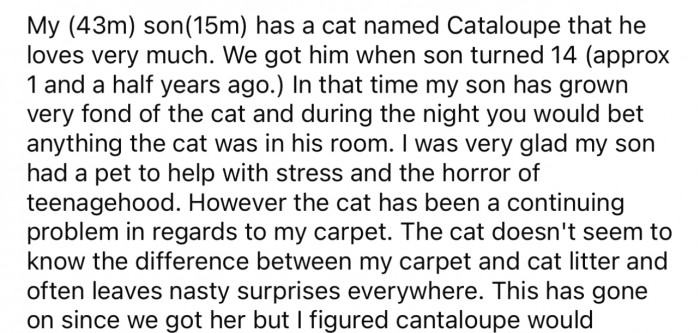
He then explains what the problem is and how he decided to resolve it.
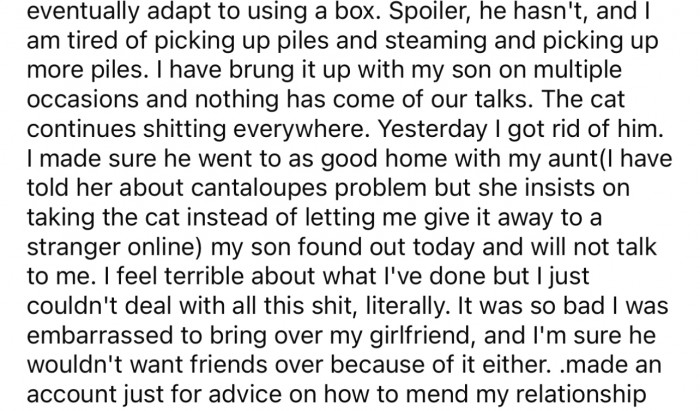
Then he added in an update after receiving some comments he needed to address.
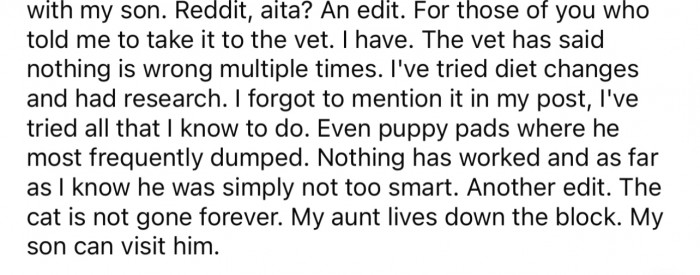
The Impact of Loss on Family Dynamics
Loss, particularly in the context of pets, can significantly affect family dynamics. Dr. Nancy Allen, a family psychologist, explains that pets often serve as important emotional anchors within households.
When a family member, including a pet, is removed without proper communication, it can lead to feelings of betrayal and confusion among family members. Research shows that open discussions about loss can foster healing and understanding, emphasizing the importance of transparency in family decisions.
The Emotional Impact of Pet Loss
The Redditor's experience of having their cat removed without notification highlights the profound emotional impact of pet loss. Research shows that losing a pet can trigger intense grief, which is often underestimated by society.
According to a study published in the Journal of Applied Animal Welfare Science, individuals often experience feelings of sadness, anger, and confusion after losing a beloved pet, similar to the stages of grief associated with human loss.
Right off the bat people started calling him TA in this situation.

People really had a lot to say about this situation and ultimately they said the dad was in the wrong.
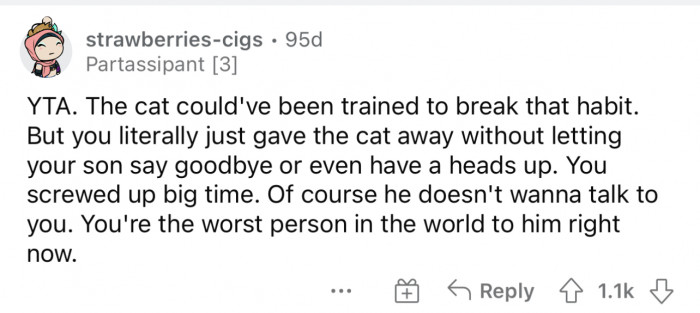
Simple, but they make a point. The dad didn't even let the boy say goodbye to the cat.

Children, in particular, may struggle with understanding the reasons behind the removal of a pet. Developmental psychology research indicates that children experience grief differently from adults, often expressing it through behaviors rather than words.
Dr. David Robinson, a child psychologist, notes that children may benefit from age-appropriate explanations about the loss and opportunities to express their feelings, which can facilitate healthier processing of their grief.
Moreover, the bond between pets and owners can evoke strong emotional responses, making the loss particularly challenging. A study from the University of Virginia found that pet owners often report a deep sense of companionship that significantly impacts their mental health and well-being.
Lots of people were assuming that the dada didn't put in the effort to properly train the kitten to use the bathroom in the litter box.
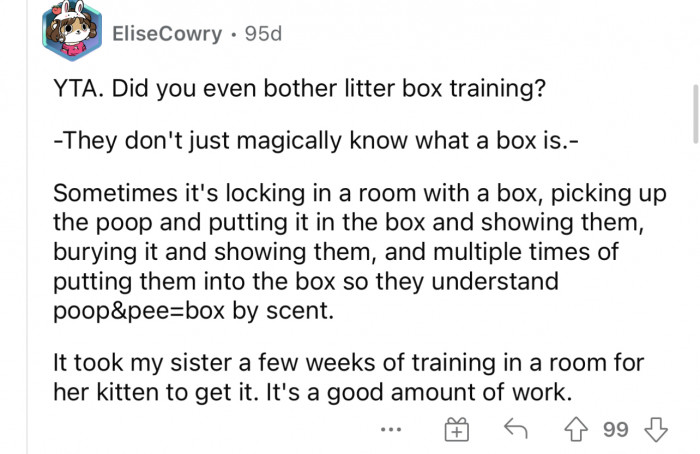
Taking the cat to the vet would be great just in case the litter box issue is more of a medical issue.
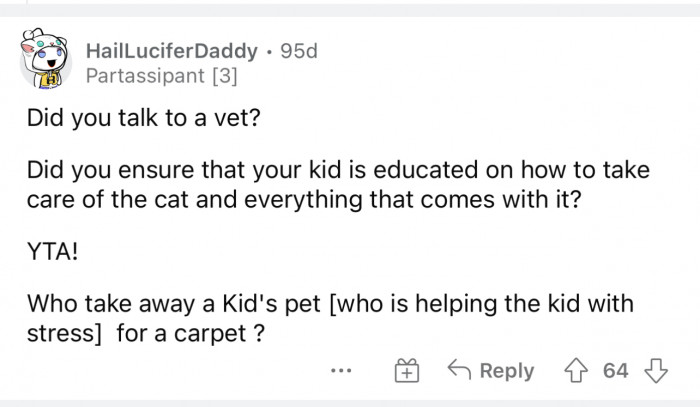
Again, people didn't have a lot of nice things to say about this Reddit story.
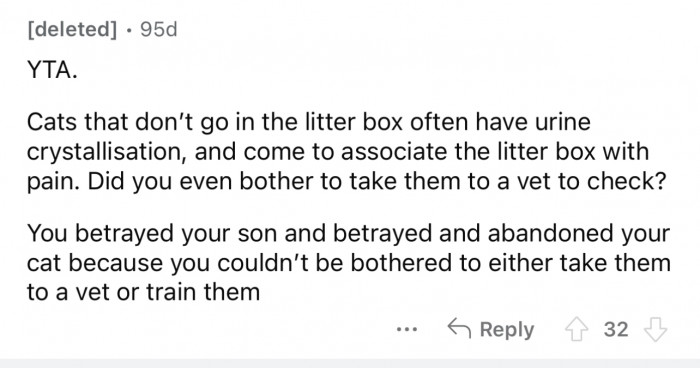
Understanding Parental Authority and Communication
The actions of the father in this situation highlight the complexities of parental authority and decision-making. Research in family systems theory suggests that parental decisions can significantly influence children's emotional outcomes.
Dr. Lisa White, a family therapist, explains that when parents make unilateral decisions without consulting their children, it can lead to feelings of disempowerment and resentment. Encouraging collaborative decision-making can improve family relationships and reduce conflict.
Navigating Grief and Loss
Understanding the grieving process is crucial for individuals coping with the loss of a pet. Experts suggest that acknowledging one's feelings and allowing oneself to grieve is essential for healing. According to Dr. Ramani Durvasula, a clinical psychologist, "Grief is a natural response to loss, and it's important to honor those feelings rather than suppress them." Engaging in rituals, such as memorializing the pet or sharing memories with others, can facilitate the grieving process, as noted by Gretchen Rubin, a happiness researcher, who states, "Creating a tangible way to remember a beloved pet can help in processing the loss and finding closure."
There were so many other options before giving the cat away to someone especially without letting the son say goodbye.
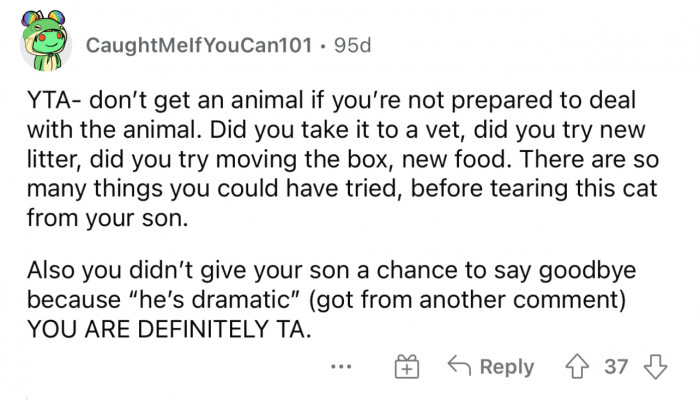
Straight to the point. The son has a reason to be upset.

Cat owners know what's up. The cat was probably just trying to communicate and instead it got kicked to the curb.

Communication styles within families play a crucial role in how decisions are perceived. Studies show that open and empathetic communication can enhance family cohesion and understanding.
In this context, fostering a culture of honesty and dialogue within the family can mitigate feelings of betrayal and promote mutual respect. Family therapy can provide a safe space for addressing these issues and improving communication patterns.
Additionally, seeking support from friends or pet loss support groups can provide valuable emotional resources during this difficult time. Research highlights that sharing experiences with others who understand the grief can be incredibly healing.
Yes, OP is TA especially when you take into account that he took away the cat that helped his son most with stress.
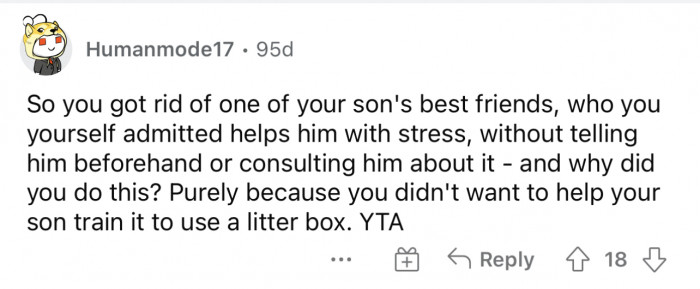
The whole thing is honestly just terrible and I'd expect the son to be mad.

This was not the best decision on the dad's part when it came to the cat.
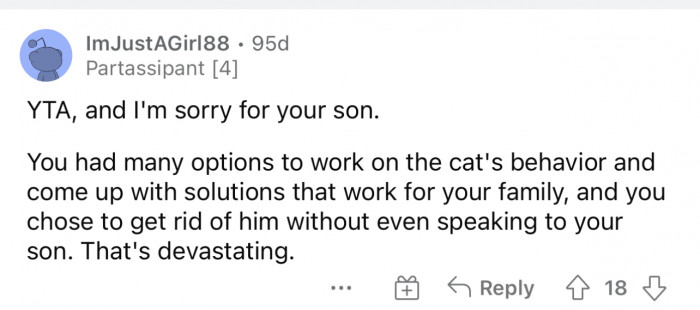
The Role of Emotional Validation
Emotional validation is essential in navigating family conflicts, especially when it comes to loss. Research indicates that when family members feel their emotions are acknowledged, it can significantly reduce feelings of isolation and resentment.
Dr. Mark Thompson, a clinical psychologist, highlights that practicing emotional validation can foster stronger family bonds and promote healthier emotional processing. Encouraging family members to express their feelings openly can help build empathy and understanding.
The Importance of Communication in Family Decisions
This situation also highlights the importance of communication within families regarding pet ownership. Open discussions about decisions affecting pets can prevent misunderstandings and emotional distress.
Studies show that families who communicate effectively about pet responsibilities are more likely to create supportive environments that honor the emotional needs of all family members.
Giving the cat up just seems like he gave up on the cat and his son completely.
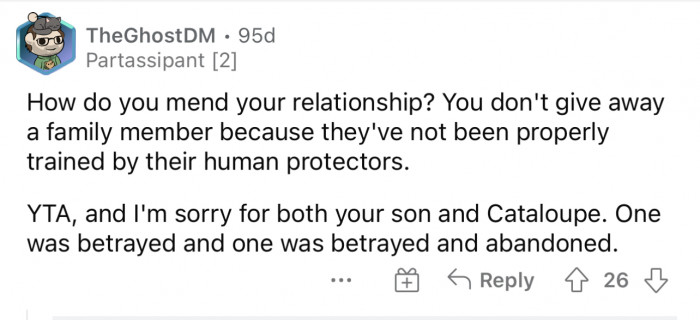
Kids really pay attention to things like this and it could be teaching him to give up on animals and other things just as easily as the dad did.

It was definitely not the right solution.
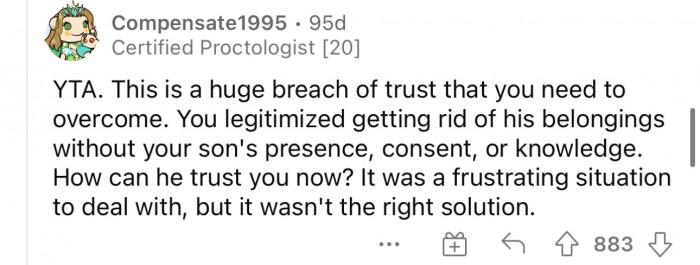
Understanding the grieving process is crucial when dealing with the loss of a pet. Research in bereavement psychology indicates that individuals may experience a range of emotions, including sadness, anger, and guilt.
Dr. Sarah Green, a grief counselor, emphasizes that allowing family members to grieve in their own way and at their own pace is essential for healing. Providing supportive environments can facilitate healthy grieving and emotional recovery.
I think the biggest thing was not telling him at all or even having any conversation prior about the potential of getting rid of the cat.
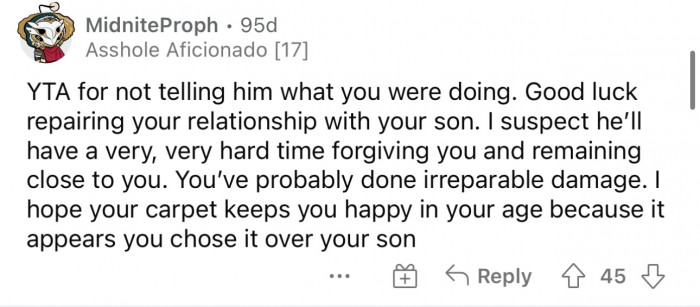
Obviously the son's feelings are valid.
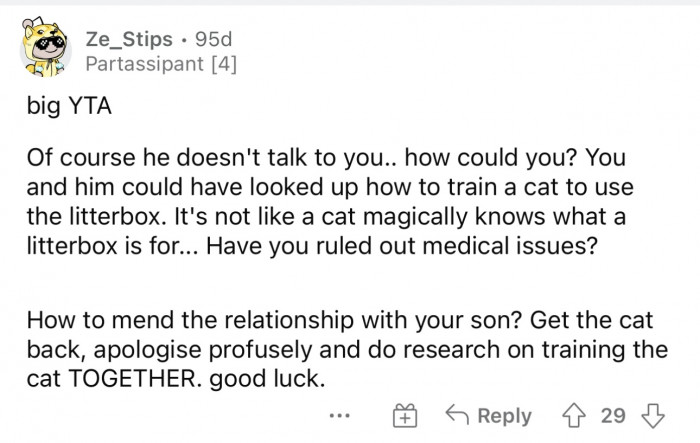
He honestly can't expect his son to trust him again.
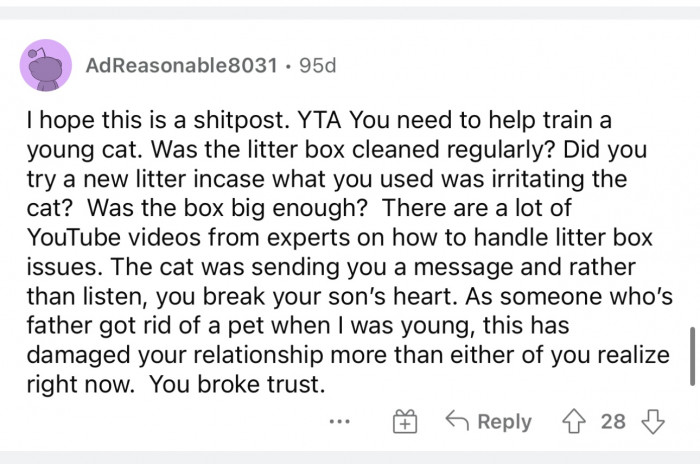
Encouraging Family Support and Collaboration
Encouraging family support and collaboration can significantly enhance emotional well-being during times of loss. Studies show that families who engage in collective grieving processes often experience stronger bonds and improved emotional resilience.
Dr. Emily Carter, a family psychologist, notes that creating rituals or shared activities in memory of the lost pet can help families come together and process their grief collectively, fostering a sense of unity.
The 5 minute distance doesn't make things any better.

Well, what do you think? We have to say that this Reddit post was one of those that caught us a little off guard because it actually had a majority, if not all, of comments pointing to OP being TA In the story.
This story definitely is sad and we feel very sorry for the poor kid who lost his cat. We hope things will work out for him.
Psychological Analysis
This situation illustrates the profound emotional connections we have with our pets and the impact of loss on individuals. Recognizing the significance of these relationships is crucial for understanding the grieving process and offering support.
By promoting open communication within families, we can create healthier environments that respect the emotional needs associated with pet ownership.
Analysis generated by AI
Analysis & Alternative Approaches
The emotional impact of losing a pet cannot be overstated, and understanding this grief is essential for healing. By acknowledging feelings and engaging in supportive practices, individuals can navigate the complexities of pet loss.
Ultimately, fostering communication within families regarding pet ownership can help prevent misunderstandings and promote healthier emotional outcomes.
Providing resources for grief support can empower families to navigate the loss of a pet more effectively. Research indicates that access to grief counseling and support groups can significantly aid in the healing process.
Encouraging families to seek these resources can foster healthier coping strategies and promote emotional well-being in the aftermath of loss.
Analysis & Alternative Approaches
Understanding the emotional complexities surrounding the loss of a pet is crucial for family dynamics and individual healing. Research consistently highlights the importance of open communication, emotional validation, and collaborative support in navigating these difficult experiences.
By fostering an environment that encourages expression and mutual respect, families can work through their grief together and emerge stronger.



